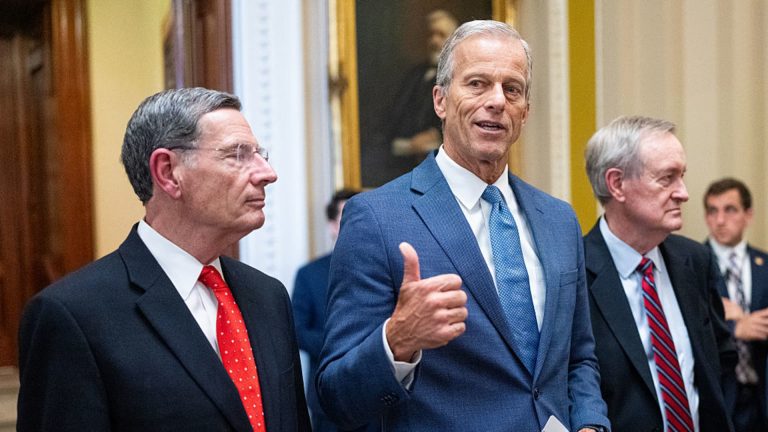
Here are five key things investors need to know to start the trading day:
1. Tech trade
2. House rules
Senate Majority Leader John Thune, R-S. Dak., flanked by Sen. John Barrasso, R-Wyo., and Sen. Mike Crapo, R-Idaho, speaks to reporters after the Senate passed President Trump’s “big beautiful bill” reconciliation package on Tuesday, July 1, 2025.
Bill Clark | Cq-roll Call, Inc. | Getty Images
After more than 24 hours of continuous voting, the Senate managed to narrowly pass President Donald Trump’s spending package on Tuesday. Three Republicans — Thom Tillis of North Carolina, Rand Paul of Kentucky and Susan Collins of Maine — joined Democrats and voted against the bill, requiring Vice President JD Vance to cast the tie-breaking vote. But it’s still not smooth sailing for the bill, which now will head back to the House of Representatives for lawmakers to approve the Senate’s changes. Several Republicans in the House have already voiced their opposition to the upper chamber’s version of the bill, which includes a $5 trillion increase in the debt ceiling. For a walkthrough of what the Senate’s spending package would mean for your money, click here.
3. Subsidies and deliveries
Elon Musk reacts during a press event with U.S. President Donald Trump (not pictured), at the White House in Washington, D.C., U.S., May 30, 2025.
Nathan Howard | Reuters
Shares of Tesla dropped more than 5% Tuesday amid an ongoing spat between the EV maker’s CEO, Elon Musk, and Trump, who in recent days have traded jabs on social media over the Republican spending bill. The president on Tuesday responded to Musk’s criticism of the legislation — which would soon end tax credits for EVs — by threatening to have DOGE “take a good, hard look” into the subsidies received by Musk’s companies. “He’s upset that he’s losing his EV mandate … but he can lose a lot more than that, I can tell you. Elon can lose a lot more than that,” Trump told reporters on Tuesday. The drop in shares of Tesla, which are down about 7% so far this week, also comes ahead of the company’s second-quarter deliveries report, due Wednesday morning.
4. If not for tariffs
U.S. Federal Reserve Chair Jerome Powell testifies before a House Financial Services Committee hearing on “The Semiannual Monetary Policy Report to the Congress,” on Capitol Hill in Washington, D.C., U.S., June 24, 2025.
Kevin Lamarque | Reuters
Federal Reserve Chair Jerome Powell said Tuesday that the central bank would have cut rates by now if it wasn’t for Trump’s broad tariffs. Speaking at the European Central Bank forum in Portugal, Powell said that the Fed “went on hold when we saw the size of the tariffs and essentially all inflation forecasts for the United States went up materially as a consequence of the tariffs.” The central bank has held its key borrowing rate steady in a range between 4.25% and 4.5% since December. Powell, meanwhile, has been the target of non-stop attacks from Trump, who has called the Fed chair “stupid” and demanded rate cuts. Asked on Tuesday if he would continue as Fed governor following the end of his term as chair next year, Powell said, “I have nothing for you on that today.”
5. ‘Take big swings’
Dylan Field, co-founder and CEO of Figma, speaks at the startup’s Config conference in San Francisco on May 10, 2022.
Figma
Design software company Figma became the latest tech company to file for an IPO on Tuesday, more than two months after saying it confidentially filed paperwork with the SEC. The company, which plans to trade under the ticker “FIG” on the New York Stock Exchange, was valued at $12.5 billion in a tender offer last year. In a letter, the startup’s CEO, Dylan Field, told investors that they should expect Figma to “take big swings” as a public company, including through acquisitions. Figma was set to be acquired by Adobe in a $20 billion deal announced in 2020, but the companies scrapped the agreement in 2023 due to regulatory concerns in the UK. Figma received $1 billion from Adobe in breakup fees.
— CNBC’s Sean Conlon, Tanaya Macheel, Brian Evans, Erin Doherty, Jesse Pound, Lora Kolodny, Alex Harring and Jordan Novet contributed to this report.

